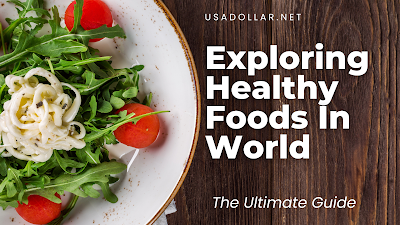Introduction:
In a world where convenience foods and processed snacks dominate our diets, it's essential to remember the significance of nourishing our bodies with wholesome, nutrient-rich foods. Incorporating a variety of healthy foods into our daily meals can have a profound impact on our overall well-being. From boosting our immune systems to improving cognitive function, consuming a balanced and diverse diet is crucial. In this article, we will delve into a comprehensive list of the best healthy foods in the world, highlighting their nutritional benefits and explaining why they should be a part of our regular diet.
Blueberries:
Blueberries are often referred to as "superfoods" due to their incredible nutritional profile. Packed with antioxidants, vitamins, and fiber, they offer numerous health benefits. The high concentration of antioxidants in blueberries helps combat oxidative stress and reduce the risk of chronic diseases, including heart disease and certain types of cancer. Additionally, their natural compounds may improve brain health and enhance memory function.
Salmon:
Salmon, a fatty fish rich in omega-3 fatty acids, is a powerhouse of nutrientsRegular consumption of salmon has been linked to a decreased risk of heart disease, improved brain function, and better overall mood. This fish is also an excellent source of high-quality protein, vitamins D and B12, and minerals such as selenium and potassium.
Kale:
Kale is often hailed as one of the healthiest vegetables on the planet. Kale is also a great source of fiber and antioxidants. Its nutrients contribute to eye health, bone strength, and a strong immune system. Incorporating kale into your diet can be as simple as adding it to salads, smoothies, or sautéing it as a side dish.
Quinoa:
Quinoa is a gluten-free grain that has gained popularity for its remarkable nutritional properties. It is rich in protein, fiber, and essential amino acids, making it an excellent alternative to traditional grains. Incorporating this versatile grain into your meals can help regulate blood sugar levels, support weight management, and provide sustained energy throughout the day.
Avocado:
Avocado, often referred to as a "healthy fat," is an incredibly nutritious fruit. It is packed with monounsaturated fats, which promote heart health by lowering LDL cholesterol levels. Avocados also contain fiber, potassium, vitamins K, E, C, and various B vitamins. These nutrients contribute to improved digestion, reduced inflammation, and enhanced skin health. Add avocado slices to salads, sandwiches, or enjoy it as guacamole for a delicious and nutritious treat.
Greek Yogurt:
It contains less lactose than regular yogurt and boasts a creamy texture. The probiotics found in Greek yogurt support gut health and aid digestion. The high protein content helps promote muscle growth, aids in weight management, and provides a feeling of fullness. Enjoy Greek yogurt as a standalone snack, or add it to smoothies, breakfast bowls, or baked goods.
Spinach:
Spinach is a leafy green vegetable that deserves a spot on every list of healthy foods. Packed with vitamins A, C, K, and folate, spinach offers numerous health benefits. The abundance of antioxidants found in spinach helps protect against oxidative stress and may reduce the risk of chronic diseases. Spinach is also an excellent source of iron, which supports healthy blood production. Incorporating spinach into salads.
Spinach:
Spinach is a leafy green vegetable that deserves a spot on every list of healthy foods. Packed with vitamins A, C, K, and folate, spinach offers numerous health benefits. The abundance of antioxidants found in spinach helps protect against oxidative stress and may reduce the risk of chronic diseases. Spinach is also an excellent source of iron, which supports healthy blood production. Incorporating spinach into salads.


No comments:
Post a Comment